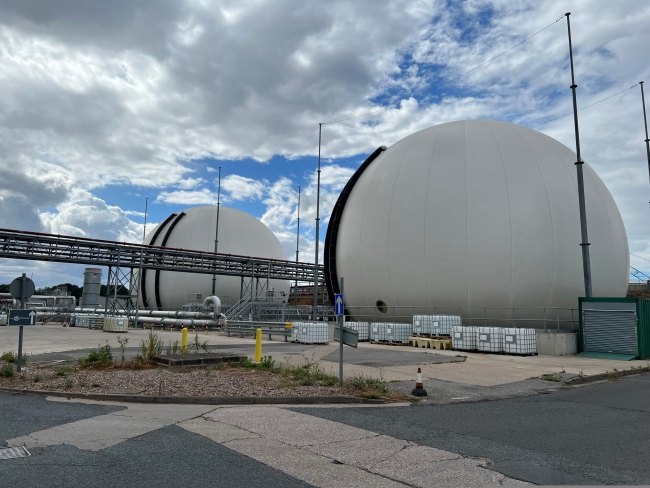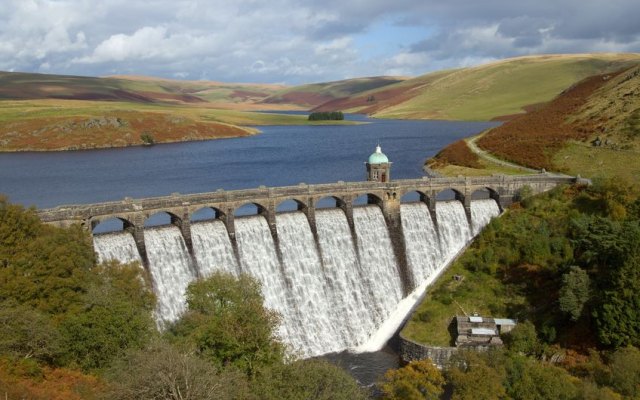Leakage
Companies are using new techniques to find and fix more leaks
38%
reduction in leaks since the 1990s
1bn
the number of litres to be reduced from leakage by 2030
426000
km of pipes underground
Maintaining a network of buried pipes that is long enough to reach the moon is a big job and we are determined to keep making progress.
Water companies operate thousands of kilometers of buried pipes, taking fresh, clean water to homes and businesses across the UK. These pipes are often hidden from sight, buried under roads, footways, and private land. As pipes age, they become brittle, and forces from ground movement, tree roots, building work, utilities excavations, and extreme weather can make them leak, losing precious water on its route to customers.
We use a range of cutting-edge techniques to find, quantify, and fix these leaks to make sure that water flows to where it’s needed.
Some leaks are straightforward to find as water is visible at the surface in the drier months, and these tell-tale signs can be used to pin-point where repairs are needed.
But many leaks are much harder to find. Tiny cracks in buried pipes and fittings grow over time, until they open enough to let water pass through into the soil beneath roads and footways. Satellite imaging, drone surveys, acoustic sensors, in-pipe monitoring and smart metering are all playing an increasing role in the hunt for these tiny but important leaks.
We’re also monitoring key part of our networks in near-real time, allows us to spot problems before they breakout into leaks, and plan preventative action.
When it comes to making repairs we balance the need to fix leaks, with the need to keep Britain’s roads moving. We work with stakeholders in the highways sector and local authorities to find ways of minimising the impact of roadworks by planning working areas, and avoiding key dates in the local events calendar. Achieving this balance can mean applying for permits or holding back on making repairs until we can find the best time for customers. It may also mean we can’t replace as much pipe as we’d like, as the disruption to customers would be too great in one go.
Climate change is increasing the risk of leaks from:
- More intense rainfall in winter, and less in the summer. This dries soil in the summer, making it move and crack, compressing water pipes. This is often followed by flash floods, which further moves soil around pipes once rain does arrive.
- Less stable weather conditions, which include more frequent "freeze-thaw" events. These involve sudden temperature changes (for example, last year saw the temperature go from -12°C to 19°C in four days). This has effects inside and outside pipes, and can cause damage - including by freezing customer-owned pipes and plumbing.
However, despite these difficulties the industry has reduced leakage levels by 43% since the 1990s, and water companies in England have just committed to reducing leakage by a further 16% by 2025.
Achieving this will be a huge effort, and progress will be hampered during extreme weather events which are becoming more frequent in the UK. In addition to fixing leaks in pipes under the street, more will need to be done by others to repair pipes buried under private gardens. These pipes are often the property of the homeowner, and leakage from private pipes and domestic plumbing can account for a third of the water lost in some parts of the UK.
More on leakage from Ofwat
+ -
There are many reasons why water pipes leak.
- Over time, pipes can corrode and weaken, leading to small holes or cracks in the pipe walls.
- Ground movement, such as natural shifts in building foundations, can also put a strain on pipework.
- Pipes can also be damaged by external factors, such as tree roots, construction work, or accidental impacts.
+ -
Water companies operate thousands of kilometres of pipes, most of which are buried under roads. Replacing them would cost billions of pounds, increase customers bills, and disrupt transport and business across the UK.
Finding leaks and making repairs allows customers to maintain access to the water they need, keep bills low, and keep our streets moving.
Water companies are constantly testing new techniques to find and fix more leaks without causing significant disruption including targeted intervention where the benefits are strongest.
Leakage FAQs
Read more

Industry statistics
Explore the website for industry statistics including company performance, leakage and water quality

Leakage Routemap to revolutionise the reduction of leaks





